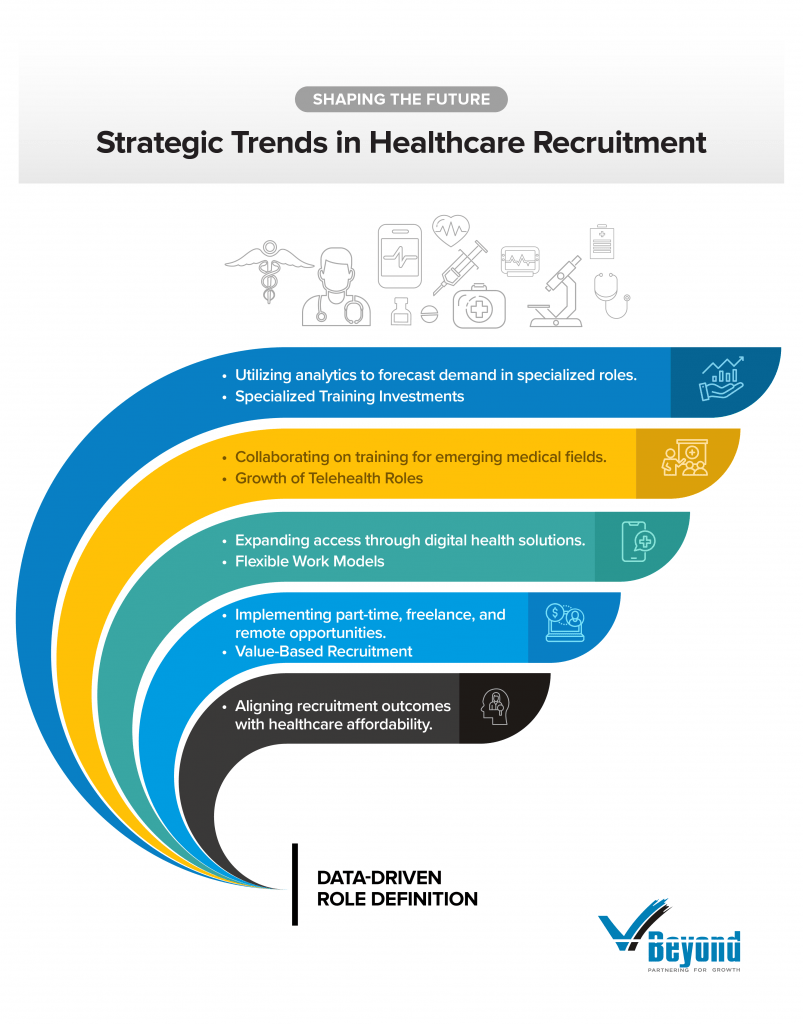Explore how recruitment agencies are transforming specialized healthcare through innovative strategies and insights. Delve into the current trends and future directions that are reshaping the landscape of healthcare talent acquisition.
Introduction
What does the future of healthcare look like when recruitment agencies redefine how we attract and place specialized talent?
In Overcoming Challenges in Specialized Healthcare Recruitment: A Strategic Guide for Organizations, we explored how healthcare organizations are increasingly facing the challenge of filling specialized roles—from neurosurgeons to healthcare IT professionals—with the right talent. But how do recruitment agencies transform these challenges into opportunities for innovation and strategic growth in the healthcare sector? This blog picks up where we left off, diving into the world of specialized healthcare recruitment from the agency’s perspective.
Here, we reveal how agencies are not just filling roles but are instrumental in shaping the future of healthcare. Join us as we delve into strategic insights that highlight how recruitment agencies are redefining the standards and expectations of specialized healthcare recruitment.
The Rising Demand for Specialized Healthcare Professionals
The healthcare sector is witnessing a significant surge in demand for specialized physicians, driven by multiple factors including an aging population, the prevalence of chronic diseases, and advancements in medical technology. Data collated from Data from the US Bureau of Labor Statistics, the Association of American Medical Colleges, and US News and World Report is interesting.
Psychiatry: A Critical Need for Mental Health Experts
With mental health challenges on the rise, especially post-COVID-19, the demand for psychiatrists is expected to increase by 7% by 2032. This specialty is recognized for its crucial role in addressing both the mental and physical aspects of psychological health.
Primary Care: The Backbone of Everyday Health
As the backbone of everyday health services, primary care faces a looming shortage, with an anticipated deficit of up to 48,000 physicians by 2034. The growth projections stand at 4% for family medicine and 2% for internal medicine by 2032.
Urgent Care: Rapidly Expanding Access
The convenience of urgent care facilities continues to attract more patients, with these centers now outnumbering emergency departments in the US.
Emergency Medicine: High Stakes and High Demand
Despite the high-pressure environment and concerns over burnout, the need for emergency medicine physicians is projected to grow by 3% by 2032.
Geriatrics: Addressing an Aging Population
The aging baby boomer generation is creating a significant demand for geriatric care, with specialists in this field becoming increasingly necessary.
Cardiology and Neurology: Specialists in High Demand
These critical specialties are expected to see a 3% growth in employment opportunities by 2032, reflecting the ongoing need for expertise in heart and neurological conditions.
Women’s Health: A Growing Field
Expected to grow by 2% by 2032, this field remains essential, especially as legal and healthcare policies evolve.
Anesthesiology: Essential Yet Overlooked
Vital for surgical procedures, the demand for anesthesiologists is also projected to increase by 3% by 2032.
Strategic Questions for Future Recruitment
As recruitment agencies look to address these growing demands, several strategic questions emerge:
- How can recruitment agencies develop innovative strategies to ensure an adequate supply of highly specialized physicians across these diverse fields?
- What roles can agencies play in preparing for the projected shortages in primary care and geriatrics, considering the critical impact on public health?
- In what ways might recruitment practices need to adapt to attract and retain talent in high-stress areas like emergency medicine and anesthesiology?
Addressing these questions will be crucial for recruitment agencies aiming to not just fill positions, but also to strategically support the healthcare sector as it navigates these dynamic changes.
Shaping the Future: Current Trends Impacting Strategic Adaptations in Specialized Healthcare Recruitment
The healthcare sector is witnessing a burgeoning demand for specialized professionals and significant economic pressures (as highlighted in PwC’s Next in health services 2024: Healthcare’s big squeeze and the way out) from factors such as inflation, tight labor markets, and high drug costs. The juxtaposition of factors is creating unique trends in specialized healthcare recruitment, necessitating innovative solutions for a balanced approach:
1. Precision in Role Definition and Talent Mapping
As the demand for specialized roles grows, precise role definition and talent mapping become crucial. Recruitment agencies must employ advanced analytics to accurately predict which specialties will see increased demand and determine the exact type of specialists needed, such as genetic counselors, robotic surgery technicians, or specialists in rare diseases. This targeted approach allows for more efficient use of resources, ensuring that recruitment efforts are directly aligned with actual market needs, thereby mitigating the cost pressures.
2. Investment in Specialized Training and Development
Given the tight labor market and the specialized nature of the demand, there is a clear trend towards investing in training and development programs. Recruitment agencies, in partnership with healthcare organizations and educational institutions, can develop specialized training programs tailored to bridge the gap between existing skills and the evolving requirements of the healthcare sector. Programs focused on emerging fields like precision medicine or specialized surgical techniques ensure that professionals stay at the forefront of their fields. The investment not only helps in reducing the long-term costs associated with sourcing talent but also ensures a quicker turnaround in meeting urgent healthcare needs.
3. Expanding Telehealth and Remote Care Roles
Economic pressures coupled with advancements in digital health technologies are accelerating the shift towards telehealth and remote care roles. Recruitment strategies must adapt to this shift by prioritizing the sourcing of professionals who are not only clinically proficient but are also technologically savvy, such as psychiatrists who can provide telepsychiatry to remote or underserved populations. By doing so, healthcare organizations can extend their services more cost-effectively, reaching a broader patient base without the additional overheads of traditional care settings.
4. Embracing Flexible and Hybrid Work Models
To address both the increased demand for specialized talent and the economic constraints, the healthcare industry is moving towards more flexible and hybrid work models. This paves the way for the strategic deployment of specialized professionals, like pediatric endocrinologists or rheumatologists, where and when they are most needed, maximizing their impact while managing costs. Recruitment agencies will need to adapt by offering more flexible staffing solutions, including part-time, freelance, and remote positions, which can attract a wider pool of candidates.
5. Strengthening Value-Based Recruitment
Amid the focus on cost management and efficiency, there is a growing inclination towards value-based recruitment, where the outcomes and the quality of the recruitment process are aligned with the broader goals of healthcare affordability and effectiveness. The approach is particularly relevant in specialized healthcare where the impact of hiring the right specialist, such as those in oncology or cardiology, can significantly affect patient outcomes and healthcare costs. This means not just filling positions but doing so in a way that maximizes the value these professionals bring to the organization, particularly in managing chronic diseases, preventive care, and patient outcomes.

Strategic Recruitment in Specialized Healthcare: Pioneering Future Solutions
Focusing on the trends mentioned above, recruitment agencies can develop more strategic, responsive, and cost-effective approaches to staffing in specialized healthcare roles, addressing both the increasing demand and the economic pressures faced by the sector. These insights not only help in optimizing the recruitment process but also ensure that the healthcare workforce is prepared and capable of meeting the future needs of the industry.
1. Predictive Talent Mapping: To proactively meet healthcare demands, recruitment agencies can leverage predictive analytics to map future staffing needs. By integrating data from healthcare trends, demographic shifts, and technological advancements, agencies can predict which specialties will face shortages. This enables the creation of targeted training programs and recruitment campaigns, ensuring readiness for future healthcare challenges.
2. Immersive Simulation-Based Recruitment: Utilize virtual reality (VR) and augmented reality (AR) technologies to offer candidates immersive job previews and skill assessments. This not only enriches candidate experience but also allows agencies to accurately gauge a candidate’s capabilities in realistic scenarios. Preparing candidates for the specific challenges they might face in their roles ensures better job fit and longer retention, particularly in high-stakes environments like surgical and emergency care.
3. Integrating Genomic Data in Candidate Screening: As personalized medicine continues to grow, the integration of genomic data in candidate screening can become a strategic advantage. Recruitment agencies could pioneer this approach by matching candidates to specialties where genetic traits significantly influence treatment outcomes, such as in oncology, cardiology, or psychiatry, enhancing the precision of personalized healthcare delivery.
4. Collaborative Recruitment Ecosystems: Create a collaborative platform that includes healthcare organizations, educational institutions, and competitors. This will give a boost to shared talent pools and resources, reducing recruitment costs and time while maximizing the fit between candidates and healthcare settings. It encourages a more cooperative and less competitive environment, leading to better healthcare outcomes.
5. Blockchain for Credential Verification: Implement blockchain technology to create a secure, immutable ledger of candidate credentials and employment histories. The technology significantly speeds up the verification process, enhances data security, and reduces the administrative burden, streamlining the recruitment pipeline while ensuring compliance and trust in the hiring process.
6. AI-Driven Psychological Profiling: Deploy AI to conduct in-depth psychological profiling of candidates to ensure they fit not only the technical requirements of the job but also the cultural and emotional demands of the healthcare environment. Using the technology can help in placing candidates in roles where they are most likely to succeed, improving job satisfaction and reducing turnover rates.
7. Global Talent Integration Programs: Develop comprehensive programs that facilitate the integration of international medical professionals into local healthcare systems. These programs could include language training, cultural acclimatization courses, and regulatory compliance education, significantly broadening the scope of potential candidates and enhancing the diversity of the healthcare workforce.
8. Sustainable Recruitment Practices: Focus on sustainability in healthcare recruitment by advocating for roles that promote environmental and social responsibility within healthcare organizations. The strategy aligns with the increasing importance of corporate social responsibility and attracts professionals who are not only skilled but also committed to these values.
Conclusion
The transformative strategies outlined in this discussion are not just responses to the pressing demands of today—they are proactive blueprints for the future of healthcare. The rapid evolution of the sector underlines the pivotal role of strategic recruitment in specialized healthcare. It is essential that recruitment agencies not only keep pace but stay several steps ahead, pioneering advancements in talent acquisition and management.
By leveraging innovative technologies and approaches—from predictive talent mapping and immersive simulation-based recruitment to integrating genomic data and AI-driven psychological profiling—recruitment agencies will equip healthcare organizations with the highly specialized talent required to push boundaries and set new standards of care.
The scope transcends from merely filling vacancies to building a robust healthcare system that is resilient, adaptive, and inclusive. One, that is prepared to meet the challenges of tomorrow and improve patient outcomes on a global scale. In embracing these visionary strategies, we ensure that the healthcare workforce is both prepared for the future and shaping it.
Ready to elevate your recruitment strategy and secure the specialized talent your healthcare organization needs? Join us at VBeyond Corporation, where we blend cutting-edge recruitment strategies with deep industry expertise to place top-tier healthcare professionals in roles where they can truly thrive. Discover more on our blog or reach out today to partner with a leader in healthcare recruitment solutions. Let’s shape the future of healthcare together.


